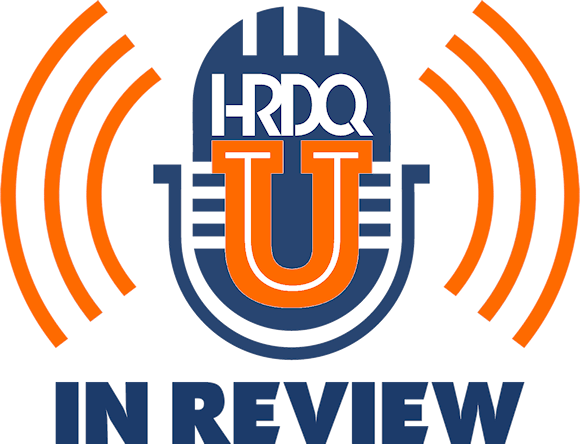Log In
View Upcoming Events


In this episode, Sarah sits down with leadership coach Carlann Fergusson to unpack key insights from her webinar, Shatter Hidden Beliefs, Sabotaging Your Self-Confidence. They explore how survival-oriented, yet self-limiting beliefs from childhood – often buried deep in the subconscious – can quietly limit leadership effectiveness, decision-making, and career growth.
Carlann shares practical strategies for spotting these patterns in yourself, from recognizing “always/never” thinking to catching overused strengths that backfire under stress. You’ll learn how to track judgmental mind chatter, test your assumptions with a simple two-step truth check, and use early physical cues to stop fight-or-flight reactions before they take over.
If you’ve ever felt stuck in self-doubt despite your accomplishments, this conversation offers a path to rewiring the self-limiting beliefs holding you back – so you can lead with confidence, clarity, and presence.
Resources & Links
00:01
Welcome to this week’s episode of the HRDQ-U In Review podcast, where we bring you the latest insights and practical tools for enhancing soft skills training in your organization. My name is Sarah, and I’m the learning events manager here at HRDQ-U. And today we are joined by Carlann Fergusson to discuss the webinar, Shatter Hidden Beliefs Sabotaging Your Self-Confidence. Now, before we dive in here, make sure you subscribe to our newsletter at HRDQU.com for exclusive updates,
00:29
upcoming webinars, and resources to help you and your team excel. Carlann, welcome. Thanks so much for joining me today. Thank you, Sarah. Now, to start us off here, what initially drew you to focus your work on self-confidence and the hidden beliefs that affect it? Well, that was definitely feedback that didn’t fit who I wanted to be and how I wanted to show up.
00:55
So initially, the first time that feedback hit was when I was a manager and I heard that I was unfriendly. And so that kind of hit me to the core. And I had to figure out why people had that perception of me when that didn’t fit how I thought I was showing up. So that was the first time. And then later, it happened again. And I heard I was too pushy. So I had to figure out what was behind it.
01:25
and some of what was behind it is my overuse strengths. Yeah, I imagine that that may have been some hard feedback to get at those points maybe. Yeah, it was, especially because I had been so reinforced and so congratulated for what I was producing from my teams. It seemed to come out of left field. I had no idea I was going to get that kind of feedback.
01:52
And now we are going to dive deeper into the topic here, but for those who didn’t have the chance to attend the webinar with us, what are the key takeaways that they missed from the event? Okay. So think the biggest key takeaway is that there’s a lot out there on confidence and a lot of it just hits surface level. know, think this way, look in the mirror, do this, do that. And that doesn’t get to the root of the issue. The only way to really get through
02:21
you know, unshakable confidence is really identifying those hidden childhood beliefs that are meant to keep you safe, but are unconsciously sabotaging your career, your relationships, you know, and who you want to be. And so you talk about hidden beliefs that sabotage our confidence. Can you explain what these are and how they typically form? Sure.
02:46
So hidden beliefs are because they are in the subconscious and they are in that midbrain. And I won’t go into the whole neurological piece of it, but that part of our brain is supposed to keep us safe. And when we were kids, we form these beliefs the way we learned beliefs as a child, which is with always or never. So, you know, as I said in the webinar, you think back on the lessons you learned as a kid to keep you safe, like never touch a hot stove, always look both ways before crossing the street.
03:16
That’s the same way that you stored these survival beliefs for you to be able to navigate the world safely. And what would you say some of the most common limiting beliefs are that you’ve seen show up in leaders or professionals that you’ve worked with? Yeah. Well, the origin story of them is very individualized, but some of the more general ones that you can kind of expect to see
03:44
have to do with what we would see as self-sacrificing behavior or overly humble behavior. And the belief behind it will be different depending on the person’s experiences. But it can be about always be humble, always do your best, but never be better than anyone else. Now, think about that, right? As a kid, we accept that. But as an adult, we go, wait a minute, which one do you want?
04:11
Do you want me to always do my best or do you want me to not be better than anybody else? So even some of the stuff that we got programmed with as kids is conflicting, right? You’d go, which one do you want me to be today? So those were things that we just stored without really challenging them being aware. Another one I see come up a lot is the person who is really good at finding problems and they’re too good at finding problems. They become the nitpicker, right?
04:40
But that is from a survival belief of, you know, I always have to be scanning to make sure I don’t miss anything. I can’t miss something. I can’t drop the ball. can’t whatever that is for them. Another one we see is when someone goes more to that fighter behavior is don’t ever let them call me stupid. Don’t ever let them tell me I’m wrong. And it brings out that more defensive side rather than a pleaser side.
05:09
So why do you think that these beliefs are so persistent, even when they no longer serve us? And maybe we know that they don’t serve us, but it’s so easy to fall back into those patterns. We don’t even know they’re there. That’s why they’re so persistent is because we don’t know until we start peeling back the onion of all the layers to get to those. They’re hidden behind major security, locks and keys and everything.
05:36
because your brain thinks it’s there to keep you safe. It doesn’t want you to know that it’s there. So it’s very unconscious when they go off. All we know is we got triggered. Something triggered us. We got emotional about it. We were righteous about it. And a lot of times we don’t even know what that is and where it came from and what started it. So that’s why they persist.
06:02
because most of the time we’re totally unaware it’s going off and that’s what’s causing us our issues. So during the webinar, you shared some practical strategies for disrupting limiting beliefs. And if you haven’t had the chance yet to check out the webinar, we will have that linked below and I highly recommend you do so. But could you highlight one or two that participants found especially impactful or easy to apply or just with clients that you’ve worked with yourself? Sure.
06:32
So one of the things you can do is figure out what your greatest strengths are, because chances are you overuse them. So just like with the feedback I got that I was unfriendly, I was extremely highly analytic, right? And very logical to the point that I wasn’t tapping into the emotional side. And I had gotten rewarded for that for decades.
06:57
And so you can start to look at your overuse strengths as a clue to where these triggers might be coming from. I also mentioned, I got the feedback later I was pushy. Well, that came from a incredible strength of being a visionary. So I could always be able to see what needed to be done to get us to a better future. But that was a hyperventilated state for me, because tomorrow always had to be better.
07:27
Right, so that was something that was my development or origin story part two. That was like, tomorrow has to be better, tomorrow has to be better. And so it was great at visioning, but then because it was hyperventilated for me, I needed to reach that future today, not tomorrow. So I would be pushing people to do things faster. So that’s the way to one of the ways to check is check your hidden strengths.
07:55
And something else you talked about was how language, especially self-talk plays a role in reinforcing or breaking these beliefs. What should people be listening for in their own internal dialogue? Yeah. So it’s more mind chatter. So when you get triggered, your self-talk or mind chatter is all about judgments on the other person. You know, they’re stupid, they’re lazy, they’re this, they’re that.
08:23
whatever you’re throwing on them is all about your own insecurities, right? And it’s a good hint to your survival belief too. So if I see somebody, well, I’ll give you mine, right? Back then. Because I can’t be emotional. If somebody’s being emotional, they’re weak. They need to get a backbone. Come on, you gotta be kidding me. Buckle up, you know.
08:48
You’re a leader, damn it. Right? So all this mind chatter, ch-ch-ch-ch, is just going off in my head. And it has nothing to do with them. They’re fine the way they are. It’s about me and my insecurity about them showing emotion, because unconsciously, they have created unsafe space for me. And I’m not even aware that I’m triggered by it.
09:12
Well, then how does shifting these beliefs impact leadership behavior or decision making in a tangible way? Oh, it’s huge. It’s huge. One, you know how we feel after we’ve gotten triggered into behavior that doesn’t fit who we want to be. It’s horrible. It makes us feel guilty. It makes us feel shame. It doesn’t fit who we want to be. Then we second guess ourselves and then we get into imposter syndrome. We get into all of this stuff that’s just a downward spiral.
09:42
And so pretty soon, you we aren’t speaking up. We aren’t making the hard decisions. We’re consulting too much. We’re doing things that are to try to overcome and prove we’re nice people. And so that impacts decision making. That impacts our effectiveness as leaders. So if we can stop getting triggered, we don’t have that shame and guilt. We can be calm. We’re in the present. When we’re in the present, we hear more clearly.
10:10
We don’t have any issues asking people for their opinions and we’re actually listening to them, not trying to get them to fit whatever we’re thinking is going on, or what we think we should do because of our own insecurities. We’re just overall really better leaders. So it’s pretty amazing. A lot of the leaders that I’ve worked with, I’d say the majority, because they’re more present,
10:36
Because that stuff isn’t getting in their way, they get promoted. You know, they get the bigger opportunities because that’s what we’re looking for. Think about it in succession planning. What always comes up, it’s these behavioral issues that people can’t put their thumb on, but they want them fixed before they’re going to promote them, before they’re going to consider them for that big project.
10:59
Do you think someone who is aware of their hidden beliefs and they’ve done a lot of work on themselves to improve, is it still easy for them to fall back into their same patterns that they’re comfortable with? Here’s the difference, right? Yes. Can they fall back into it? Yeah. Can I fall back into it? Yeah. If I’m going to get upset about my husband, it’s going to be he’s being illogical. Go guess.
11:26
Go figure. Of course, it’s going to be being illogical. But what happens is you notice it right away. You go, oh, shoot, that’s about me, not about them. Let me just apologize. I’m stressed, right? I’m stressed and I’m putting that on you. That’s unfair. So even at work, when you have those things that pop up, you know, you’ll see it. And the thing that I teach people and I didn’t talk about this in the webinar is to really start to notice your fight or flight response.
11:55
what comes first for you, right? Is that, for me, it’s the raising of the shoulders. So when I know that I’m getting stressed and raising of the shoulders and all, if I’m aware of these survival beliefs and of these, you know, this pattern, I can go, oh, here we go. It’s coming, this is me, so let me back off. Let me take a couple of deep breaths, get back into the present and just not go there. So that’s what’s great is,
12:24
they aren’t going there, right? And I always say to my clients, when you see these changes at home, that’s when you know it’s really stuck because we let our guard down at home. We can be really great at work. And then we get home and we’re all stressed out. And we expect our families to accept us the way we are, warts and all. So once you start to see that working at home and you’re not doing that anymore, that’s when
12:54
everybody gets really excited. For someone that’s just starting this inner work, what’s one small but powerful action they can take this week to begin building more confidence? So one of the things that they can do right away is to start to notice your mind chatter. Start to notice when you’re going down that path of judging somebody else or you’re judging the circumstances or
13:20
Why is the company making me do this? Why is the company making me work so many hours? Look, the company’s not making you work so many hours. You are probably because you’re more self-sacrificing. You say yes when you should say no, or you should say if. Yes, if you can do it. Yes, if you can give me more time. Yes, if you can take this other project, move it out or take it off my plate or whatever. So when we’re caught in these patterns, it’s just get.
13:48
to know what those are for you. Just start to see them. So when the mind chatter is your real first key, just look at it, go, what is my brain saying to myself? Why am I getting riled up right now? And is it true? So I want you to ask yourself that twice. You’re gonna ask the first time, is it true? Your brain’s gonna say, yes, it is. They’ve been doing this to me, blah, blah, blah, blah. Let it go, it needs to get it out.
14:16
And then just say to yourself, am I 100 % this is true? No, no, because we’re never 100 % about anything. We don’t know anything that we thought 20 years ago. Tomorrow can be proof false. So there’s no 100 % certainty. And as soon as we do that, we start to relax. We start to calm down. We take those deeper breaths. And we can start to examine that mind check.
14:43
And finally, Carlann, how can listeners stay connected with you or continue this work beyond just our conversations that we’ve had today? Thank you, Sarah. So one of the ways is just reach out to me. It’s Karlanne at propelforward.com. I’d be happy to set up some time with you just to talk and see where you want to go with this kind of work. The other thing is you can find a lot of information about it on erasingdoubt.com.
15:12
So those are two ways. And we will have that information linked down below for you. Carlann, thank you so much for your time today. Thank you, Sarah. And we hope you enjoy listening to the HRDQ-U In Review podcast, available on all major streaming platforms. If you did enjoy today’s episode, make sure to give us a follow and leave us a five-star review. That’s how we’re able to continue to produce this weekly content for you. Thank you all for tuning in to this week’s episode of the HRDQ-U In Review podcast brought to you by HRDQU.com.


Listen to this podcast event at no charge with your
HRDQ-U Free Access Membership
In this episode, Sarah sits down with leadership coach Carlann Fergusson to unpack key insights from her webinar, Shatter Hidden Beliefs, Sabotaging Your Self-Confidence. They explore how survival-oriented, yet self-limiting beliefs from childhood – often buried deep in the subconscious – can quietly limit leadership effectiveness, decision-making, and career growth.
Carlann shares practical strategies for spotting these patterns in yourself, from recognizing “always/never” thinking to catching overused strengths that backfire under stress. You’ll learn how to track judgmental mind chatter, test your assumptions with a simple two-step truth check, and use early physical cues to stop fight-or-flight reactions before they take over.
If you’ve ever felt stuck in self-doubt despite your accomplishments, this conversation offers a path to rewiring the self-limiting beliefs holding you back – so you can lead with confidence, clarity, and presence.
Resources & Links
[ PODCAST PLAYBACK ]
You must be signed-in with your membership account to access this content.
Enjoyed this podcast? Have suggestions on how we can improve? Please take our quick survey and receive a coupon for 15% OFF any of our individual membership plans.

*Instant 15% coupon available upon completion of survey.
Want to learn more? Become an Individual or Corporate member to watch this and hundreds more webinars!
Discover how hidden beliefs and subconscious programming undermine your self-confidence – and learn how to break free from outdated success rules.

Carlann Fergusson
Carlann Fergusson is an executive coach who focuses on deep behavioral change. Her guidance is based on over three decades of coaching and mentoring leaders and executives across companies such as Intel, Visteon, and Meijer. Twelve years ago, she left her senior leadership position to start her own business, Propel Forward LLC. She is grateful to have a career where she can help others crush limiting beliefs and wildly succeed in their work and personal lives. Carlann resides in Orlando, Florida, with her husband of 42 years. They shamelessly lure their children and grandchildren with visits to Disney.
Carlann is the author of the book, The Insightful Leader: Find Your Superpowers, Crush Limiting Beliefs and Abolish Self-Sabotaging Behaviors. The book received endorsements from Marshall Goldsmith and Jack Stahl. Published by a division of Bloomsbury.

Training Tools for Developing Great People Skills
This event is sponsored by HRDQ. For 45 years HRDQ has provided research-based, off-the-shelf soft-skills training resources for classroom, virtual, and online training. From assessments and workshops to experiential hands-on games, HRDQ helps organizations improve performance, increase job satisfaction, and more.

Mental Models Customizable Courseware
Enhance your decision-making with Mental Models, an engaging training that guides participants to challenge assumptions, uncover hidden beliefs, and distinguish fact from opinion through practical, hands-on learning.
Buy at HRDQstore.com
Personal Style Inventory
Participants will strengthen self-awareness by exploring their personality styles, core motivations, and stress responses. Through reflection and adaptability, they’ll break unproductive patterns and foster personal growth that drives team success.
Buy at HRDQstore.comThe HRDQ-U In Review Podcast, brought to you by HRDQU.com, brings you the latest insights and practical tools for enhancing soft-skills training in your organization. As a learning community for trainers, coaches, consultants, managers, and anyone passionate about performance improvement, we interview subject matter experts and thought leaders from recent webinars they presented with us to take a deeper dive into the content they shared and answer all your questions. Join us as we explore new ideas and industry trends, share success stories, and discuss challenges faced by professionals.
The HRDQ-U In Review Podcast is intended for HR and training professionals, organizational development practitioners, and anyone interested in improving workplace performance and productivity.
New episodes of HRDQ-U In Review are released every week.
The length of the episodes varies, but they typically range from 15-30 minutes.
The podcast covers a wide range of topics related to HR and organizational development, including leadership development, team building, communication skills, conflict resolution, employee engagement, and more.
No, HRDQ-U In Review is completely free to listen to.
You can listen to any available HRDQ-U In Review Podcast right on our website at HRDQU.com via our embedded Spotify player on the related webinar page. In addition to our self-hosted option, you can find the HRDQ-U In Review Podcast on many of the popular streaming services, which are listed above.